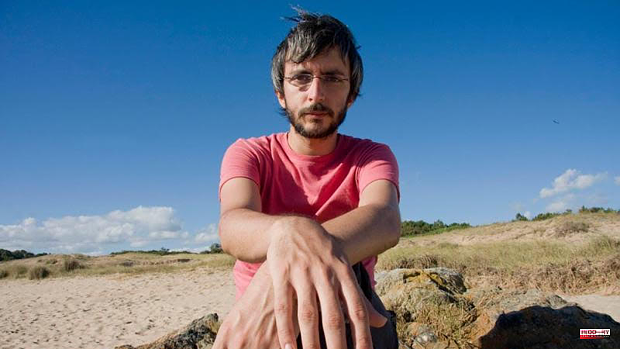Xoel López was "a traitor to his past", as he himself admits. He had it all when he decided to practically change his life: acclaimed albums behind him with Deluxe, fame, criticism from him and a large retinue of fans who filled the venues wherever the musician from Coruña played. Also, why not say it, he had money. And there came a time in 2008 when all that tired him and he wanted to leave it behind.
Guitar behind his back while he got on the plane to America, where in addition to finding the place of his disconnection in Argentina, he would also find the necessary ingredients to return with a new, exotic sound that would break not only with the previous music of his band. Deluxe, but with the Spanish alternative scene: in 2012 his album 'Atlántico' was released, rejected at first, revered later.
The journalist Javier Becerra collects all this in his book of the same name, a kind of tribute to the 10 years of the album that changed lives. “It needs to be revalued, it is one of the best Spanish pop albums,” the writer enthusiastically assures ABC. In fact, of almost ten albums that the singer has to his credit, he defends that it is the best. And it may be a popular opinion in 2022, but in 2012 it was not even remotely: "He came out in unfavorable circumstances," summarizes Becerra.
Before his trip “to play the hippie around Argentina”, Xoel López headed Deluxe, which enjoyed enough recognition to fill Madrid's Riviera for two nights in a row; more than 5,000 people. The next step was the large venues, such as the Coliseum in La Coruña. It was an indisputable success, but Xoel "never settled in" with it, it wasn't his thing. And so he decided to leave everything behind and start from scratch. Almost presciently, with Deluxe he published the song 'Reconstrucción' in 2008: «It's the best time / To feel, change the name of so many things / And forget some faces / In the graveyard of the past». It seemed to be clear what his next step was.
Arriving in Argentina "was a cure for humility," says Becerra, because in previous years, here, he would go on stage with the greats: Quique González, Amaral, Iván Ferreiro... But nobody knew him there. Remember the writer who played in small rooms for a few dozen people, and said to the public: «This is a new song, but what does it matter, if you don't know any». But that's exactly what I was looking for. "It took away the pressure of being a star, of being aware of continuing to shine," says Becerra, adding that he believes that, in reality, "he would like to return to that situation", because Xoel López now, at the media level, is much bigger than it was in its day with Deluxe.
After his spiritual retirement he spawned 'Atlántico'. No more references to Britpop and sixties sounds, which were replaced by lyrics entirely in Spanish, Spanish guitars and bachateros sounds. "A fully Latinized album that no one was asking for in 2012," says Becerra. "There were people who considered him a traitor." And so much so that when he took the album to the Spanish stages for the first time, people shouted "This looks like Juan Luis Guerra!", and then left. Of course, says the journalist, Xoel thought: "Fuck (sic), but if I love Juan Luis Guerra."
The comeback tour "wasn't a flop, but rather a lack of enthusiasm." There was an influx of people on many dates, but on others Xoel López's small band barely played for a few dozen people. There were two main factors that triggered this stumble (let it be said, Xoel himself was already counting on it): on the one hand, the festival and 'indie' scene had forged during those years a very different sound from the one that the Coruña native was proposing at the time. «The festival groups generated an idea of robustness, of anthems, of having a coreable ethic. Xoel has nothing to do with that, the music is fragile, it has a lot of air”, explains Becerra. Vetusta Morla, the heads of this movement, brought live an impressive and seamless proposal. It was what was distilled in the scene of the past decade, and Xoel had little to do with it.
The other inconvenience is that, at first, López was not able to transfer 'Atlántico' live: «It was one of his great assets, but he wasn't convincing. With Spanish musicians it was very difficult for him to take him to the stage. They rang and nothing happened. But he kept trying and found another way to make it sound ». What came after is already known: 'Atlántico' resurfaced, and during these 10 years Xoel López, thanks to trusting in his risky proposal, is one of the most acclaimed national artists. His colleagues envy him: "'Atlántico' is an album in a state of grace", says Leiva in the book. "López signed one of the most important records of Spanish popular music of the last decade," according to Bunbury. "He did what many others did not dare," says Becerra.
The American Caravan
With 'Atlántico', Xoel managed to do something within the reach of very few: «He has brought life and music together in the composition; and he is not an esthete, but a guy who is living and making songs of what he lives ». And one of those vital experiences of those years was the American Caravan. An economic fiasco, but of a brutal artistic value. During his long travels across America, up and down, he met dozens of musicians who accompanied him on stage. Also Spanish. About thirty in all. The idea was to make a documentary that was never published, in the style of Dylan's 'Don't look back'.
“It was a brutal and great thing. When it is reviewed, people are going to put their hands in their heads and say 'Oysters, this happened!'”, Becerra says. Looking at the photos, he draws attention to the fact that all the members are men: Iván Ferreiro, Juan de Dios, Budiño, Eladio Santos, Sergio Morán, Bart Davenport... Lola García was the only woman. "Now, in 2022, this would not happen, he is aware and recognizes it," says the journalist.












